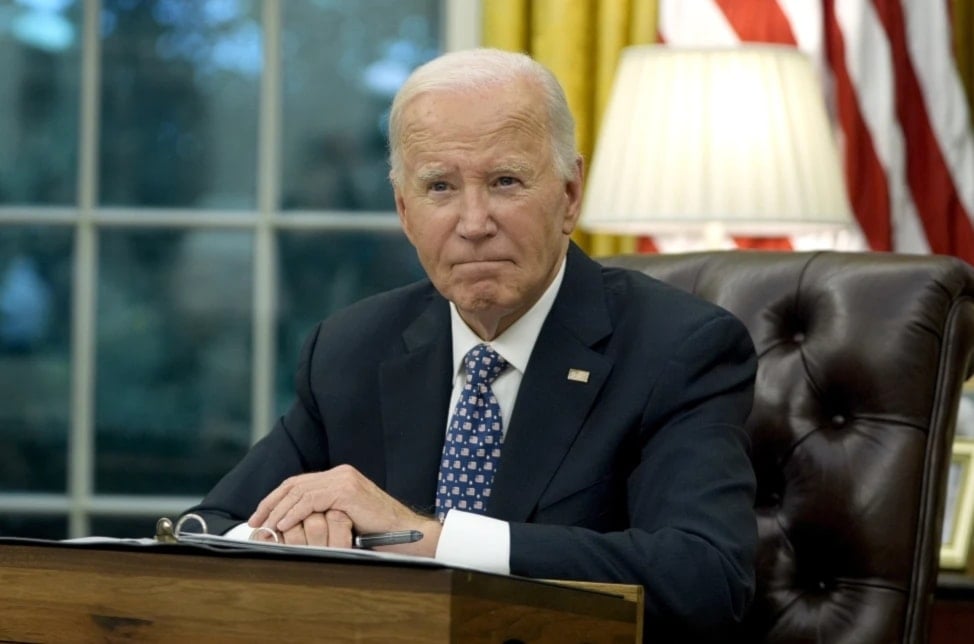Trump orders investigation into Biden’s autopen use, cognitive fitness
US President Donald Trump has launched a formal probe into Biden’s alleged use of autopen signatures to conceal cognitive decline and unconstitutionally execute presidential powers.
-

Former US President Joe Biden speaks from the Oval Office of the White House in Washington, Sept. 30, 2024. (AP)
US President Donald Trump has ordered a formal investigation into former President Joe Biden’s alleged use of autopen technology to authorize official documents, asserting that it may have been used to conceal Biden’s cognitive decline and to improperly exercise presidential powers.
The directive, issued Wednesday, targets both Biden and senior aides from his administration.
The memo, addressed to White House Counsel and Attorney General Pam Bondi, calls for a comprehensive inquiry into whether anyone “conspired to deceive the public about Biden's mental state and unconstitutionally exercise the authorities and responsibilities of the President.”
Trump said the use of an autopen in this context, if true, could invalidate key executive actions taken during Biden’s tenure.
Allegations of cognitive cover-up, abuse of power
Trump’s statement described the alleged use of autopen signatures as part of “one of the most dangerous and concerning scandals in American history.”
He claimed that the American people were deliberately misled while Biden’s signature was deployed “across thousands of documents to effect radical policy shifts.”
While autopen technology has been legally recognized for presidential use, Trump and his allies argue that using it to bypass presidential decision-making would constitute a serious constitutional breach.
Trump acknowledged using the autopen himself but only for what he called “very unimportant papers,” such as letters.
“If Biden’s aides secretly used the pen to conceal his decline while taking executive actions in his name,” Trump wrote, “that would constitute an unconstitutional wielding of the power of the Presidency.”
Biden responds, denies claims of decline
Biden dismissed the investigation as a political distraction. “Let me be clear: I made the decisions during my presidency,” he said in a statement Wednesday. “I made the decisions about the pardons, executive orders, legislation, and proclamations. Any suggestion that I didn’t is ridiculous and false.”
The former president has long faced scrutiny over his cognitive health. A special counsel report released last year by Robert Hur described Biden as a “sympathetic, well-meaning elderly man with a poor memory.”
Biden rejected the characterization, saying, “My memory’s fine.” In a May interview on ABC’s The View, Biden reiterated that he did not suffer from mental decline, “They are wrong.”
Legal history, political implications
The use of an autopen in the White House is not new. Former President Barack Obama was the first to use it to sign legislation.
A 2005 memo from the Justice Department’s Office of Legal Counsel confirmed that the president “need not personally perform the physical act of affixing his signature” for a bill to become law.
However, Trump’s directive argues that if the technology were used beyond legal bounds, particularly to authorize critical decisions without Biden’s knowledge, it would raise constitutional and legal questions about the validity of executive actions during Biden’s term.
Trump has previously alleged, without evidence, that Biden used an autopen to sign pre-emptive pardons for lawmakers involved in investigating the January 6 Capitol riot, suggesting those pardons were invalid.
Congressional Republicans escalate inquiry
House Republicans have signaled support for the probe. Republican James Comer of Kentucky, chair of the House Oversight Committee, has already initiated a parallel investigation and requested transcribed interviews with several former White House aides.
The probe, framed by Trump allies as part of a broader review of Biden-era actions, could set the stage for challenges to past executive orders, pardons, and legislation.
Critics of the investigation argue that it is politically motivated and legally unfounded, but its findings may nevertheless shape the 2025 political landscape.

 4 Min Read
4 Min Read










